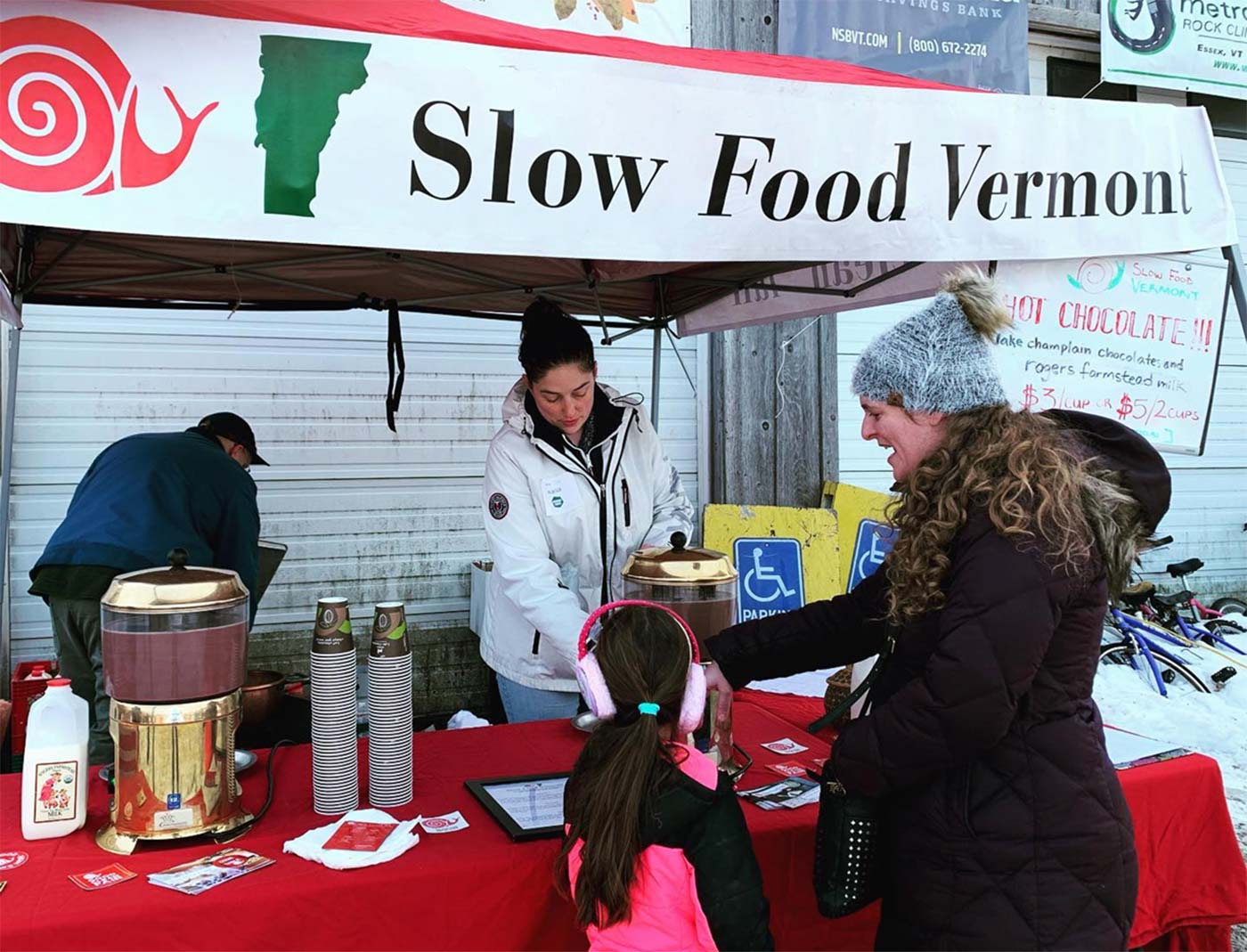Slow Food Vermont
Anyone familiar with Slow Food will recognize the iconic red snail that adorns the Slow Food Vermont (SFVT) logo. According to the Slow Food International archives, “The snail was chosen because it moves slowly, calmly eating its way through life. It also happens to be a culinary specialty in the area around the northern Italian town of Bra, where the Slow Food movement was born.” Founder Carlo Petrini and his fellow food activists sought to “defend regional traditional, good food, gastronomic pleasure and a slow pace of life.” Since its establishment in 1986, the now-international movement has “evolved to embrace a comprehensive approach to food that recognized the strong connections between plate, planet, people, politics and culture.” This is represented and manifested by the 1,500 chapters in more than 160 countries worldwide. From a Vermont perspective, the snail also represents the humble and steadfast nature of Slow Food efforts here in the Green Mountain State. And, it is perhaps no surprise that Vermont hosts the founding chapter of Slow Food in the United States, established before the movement had national presence in this country.
Even those who are unaware of the Slow Food movement can appreciate the emphasis on highlighting and celebrating the foods and foodways of particular regions. One of the biggest challenges for Slow Food here and everywhere is to make sure these efforts are equitable and inclusive. Recent efforts by SFVT focus on upholding the Equity, Inclusion, and Justice ideals outlined in the national EIJ manifesto. This document was crafted to outline and address injustices that disproportionately impact the communities most negatively affected by the industrial food system. As a result, SFVT has created a Giving Circle to make sure the resources from Slow Food Vermont are open to all. In 2021, SFVT’s Giving Circle committed funds toward BIPOC community attendance at Slow Food events and conferences as well as direct donations to relevant organizations.

The snail was chosen for the Slow Food logo because it moves slowly, calmly eating its way through life. It also happens to be a culinary specialty in the area around the northern Italian town of Bra, where the Slow Food movement was born.
The manifesto of Slow Food Vermont calls out the three fundamental principles of Slow Food directly:
Good: We believe in delicious food created with care from healthy plants and animals. Gathering around good food is a wonderful way to celebrate diversity of people, place, and culture.
Clean: We believe in nutritious food that is as good for the planet as it is for our bodies. Food should be grown and harvested with methods that improve our ecosystems and promote biodiversity.
Fair: We believe that food is a universal right. Food should be accessible to all—regardless of income—and produced by people who are treated with dignity and justly compensated for their labor.
Due to the restrictions imposed by the Covid crisis, we have had to delay many of our usual programs. In the meantime, we were able to offer two new successful remote programs, which will be included in our regular repertoire. Last fall, SFVT launched the Taste Exploration Series, an online mini-series centered on preparing and enjoying seasonal foods. Board members shared their passions for everything from Italian zucchini appetizers to dilly beans, from Eden Cider to homemade pizza dough. This past spring, in collaboration with the Department of Libraries and the Vermont Library Association, SFVT offered Plant-a-Seed kits to libraries around the state—and with the kits a chance to bring biodiversity, flavor, and history into their gardens. Thanks to an enthusiastic and widespread reception, this program allows SFVT to extend its reach to communities throughout Vermont.
We look forward to returning to regularly scheduled potlucks, workshops, and the infamous Disco Soup event each spring. This hands-on activity brings people together to prep gleaned food while boogying to the beat from a DJ. In the past, the food has gone to emergency food sites in Burlington. True to its mission of access and availability, SFVT hopes to expand this offering across the state next year.
Last fall, SFVT launched the Taste Exploration Series, an online mini-series centered on preparing and enjoying seasonal foods.

World Disco Soup Day, the international Slow Food Youth Network campaign to raise awareness about food waste, takes place every April.
In addition to supporting our programs and advocacy efforts, one delicious way to advocate for the Slow Food ideas here in Vermont is by shopping from and dining at the food growers and producers who carry the Snail of Approval award symbol. This award recognizes food and beverage establishments that pursue and practice Slow Food values in their business. As described on the Slow Food USA website, “this is more than about making good food—it’s about making commitments to the environment, local communities, [and] employees.” Because the Snail of Approval awards are determined by each chapter, Slow Food Vermont has been able to cultivate standards that fit our situation and to designate “those restaurants, bars, food and beverage artisans, stores, and markets proven to contribute to the quality, authenticity, and sustainability of Vermont’s food supply.”
If you’re interested in sampling some of the Snail of Approval products, consider a cheese tasting that features Parish Hill Creamery; prepare your next Southwestern feast with heritage corn tortillas from All Souls Tortilleria; or visit The Kitchen Table Bistro for a special meal. These and other select food folks are featured on the Slow Food Snail of Approval list at slowfoodvermont.org/snail-ofapproval.
Whether you are walking the byways of Burlington, sampling the orchards of the Northeast Kingdom, or enjoying the harvest of your own garden, we hope that you will join us to celebrate all that brings us together in the spirit of good, clean, and fair food.





